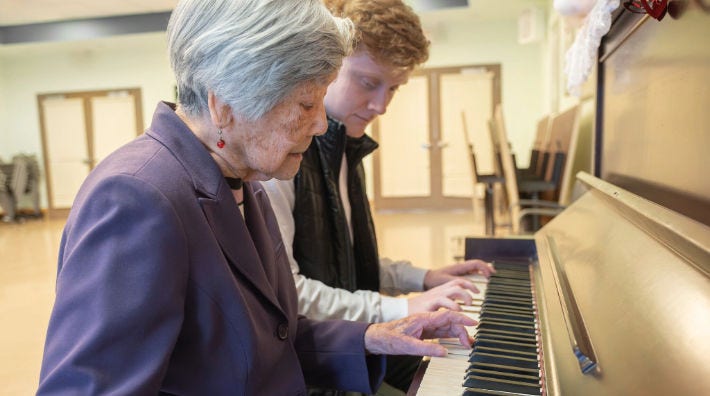How Music Therapy Can Help People With Cancer

When life gets hard, music can be a balm. Maybe listening to a playlist or making your own music lifts you up. For people facing cancer, music therapy offers a way to ease stress and find connection.
What is music therapy?
Music therapy is a type of mind-body therapy that uses music to promote healing. “For many people with cancer, it can offer a nonverbal, emotionally resonant way to cope with challenges,” said Cristiane Decat Bergerot, PhD, an American Society of Clinical Oncology (ASCO) expert and head of the Department of Psycho-Oncology at Grupo Oncoclínicas in Brazil.
Music therapists use different techniques to help patients process their emotions. One goal of music therapy can be to help manage side effects from illness. For example, many people experience pain from cancer or cancer treatment. Medications can help with physical pain, but emotional pain can be tricky to treat.
“Music can be a non-threatening way to discuss difficult issues that come up with a cancer diagnosis. Music therapy can be particularly powerful in addressing spiritual or psychological distress, as music is deeply connected with our emotions and memories. For instance, loss of independence is a very common problem for patients. A music therapist might play a song that addresses this feeling, then provide lyric analysis afterward,” said Brian Fraser, MT-BC, a music therapist at AccentCare Hospice & Palliative Care.
What happens during music therapy?
Start by asking your doctor for a referral to a trained music therapist. You can also search for one on the American Music Therapy Association website. Once you have an appointment, you’ll meet with your therapist in person or online.
Sessions usually involve a combination of music-based techniques and conversation. The specific approaches your therapist recommends depend on your needs and concerns. “During a session, I try to get a sense of what the patient’s biggest challenges or worries are. Then I help them identify how to cope with those challenges,” Fraser said.
Techniques you might use during music therapy include:
- Singing
- Songwriting
- Guided imagery with music
- Moving with music
- Analyzing lyrics
- Playing or learning to play an instrument
- Music with iso-principle. Therapists that use the iso-principle match a person’s energy level or mood and try to take it in a different direction through music.
Talk to your therapist about which approaches you prefer. They can tailor your sessions based on what you find most helpful.
How can music therapy help during cancer?
Music therapy can help people manage certain side effects of cancer and cancer treatment. These include:
- Mental health distress, including anxiety and depression
- Sleep problems
- Pain
- Nausea
- Cognitive problems
New research from the 2025 ASCO Annual Meeting showed that music therapy may be as effective as cognitive behavioral therapy (CBT) for managing anxiety in cancer survivors. CBT is a type of talk therapy.
“This study is encouraging because it suggests patients now have more ways to access support for anxiety,” said Dr. Bergerot. “The fact that both therapies were delivered remotely also highlights how flexible and accessible they are. This is especially important for people who have mobility issues or live far from treatment centers.”
If you’re interested in music therapy, ask your doctor:
- Do you recommend music therapy for me?
- How does music therapy compare with other types of therapy I could try?
- Are there any risks to consider before starting music therapy?
- Can you provide a referral to a music therapist?
Finally, remember that you don’t need musical experience to benefit from music therapy. Anyone can find the practice helpful. “Music therapy will not cure someone’s cancer,” said Fraser. “But it might allow greater acceptance of a diagnosis.”
Dr. Bergerot is a member of ASCO’s Patient Information Editorial Board.
- Written by

Written by the American Society of Clinical Oncology (ASCO) with medical and editorial review by the American Cancer Society content team.



